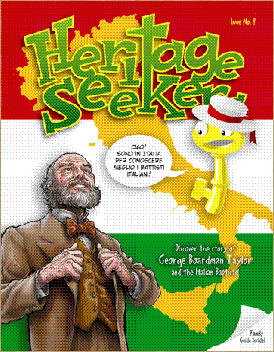I “grew up Baptist†as they say. My own religious and cultural tradition colored our Baptist heritage with a particularly pietistic bent. We weren’t fundamentalist but not liberal either. Growing up the phrase “The Baptist way†often served as the preservative equivalent to the infamous “seven last words of the church†(“We’ve never done it that way before.â€) Like many, my own spiritual journey has kept my feet on my denominational path though I’ve wandered byways that have given me new vistas and perspectives on faith and belief. They have expanded my horizons and, as is the nature of journeys, now there’s no going home again. But it’s safe to say that while my faith is different than it was (some of my friends acuse me of being an EpiscoBaptist), I’ve not strayed far from the faith of my forbearers.

(Cover of Heritage Seekers magazine for children. See below)
I do have a concern that some Baptist congregations are not doing a good job of inculcating their own “Baptist way†into the next generation. Inclusiveness, relativity, individualism, and globalization—-contemporary concepts raised to the status of universal values—-often take their toll on any group making claims to being distinctive. For the thin-skinned self-definition often feels like exclusion or elitist, and, paradoxically, rarely tolerated. But I think the distinctives that make up the people called Baptists are worth claiming and worth passing on to the next generation.
My own denomination, the American Baptist Churches (ABC/USA), puts out a wonderful children’s ministry resource in the form of the periodical titled The Pebble. Free copies are available on the National Ministries website. It’s a resource worth getting and referring to—certainly it’s a great resource for your children’s teachers and leaders (and be sure your pastor gets a copy!).
The Spring 2007 Vol. 5. No. 5 issue has a couple of terrific articles related to teaching children about their religious heritage. The feature article by managing editor Wilda Morris is titled “Teaching Children in Ways That Embody Baptist Beliefs.†Morris reminds us of the important educational axiom that how you teach is what you teach, and challenges us to think about whether we can measure our ways of teaching children against Baptist distinctives.
Other articles that address the need to teach children “the Baptist way,†are:
- “Biblical Authority & Teaching Scripture to Children,†by Cassandra Carkuff
- “How Baptists View Baptism and the Lord’s Supper,†by Mayra Castaneda
- “Share the Bible With Your Children,†by Wilda Morris
- “The Teaching Power of Baptism and the Lord’s Supper,†by Cassandra Carkuff
In addition to the articles the newsletter contains information on resources and events related to children’s ministries. Highly recommended.
Another exciting and worthy resource for introducing and educating children in “the Baptist way†is the Heritage Seekers magazine put out by the Virginia Baptist Historical Society and Center for Baptist Heritage and Studies. Heritage Seekers is a magazine designed specifically to teach Baptist heritage to children. The publication includes a family guide with each issue and each issue features a different historical figure and important principle or theme. The magazine is edited by Jon Messer, who is a member of this blog’s G.R.A.C.E. group and who started and maintains this blog.

Other Baptist heritage resources:
Baptist Heritage
Baptist History & Heritage Society
The Center for Baptist Studies
The Reformed Reader
Virginia Baptist Historical Society and Center for Baptist Heritage and Studies

1 Response to The Baptist way